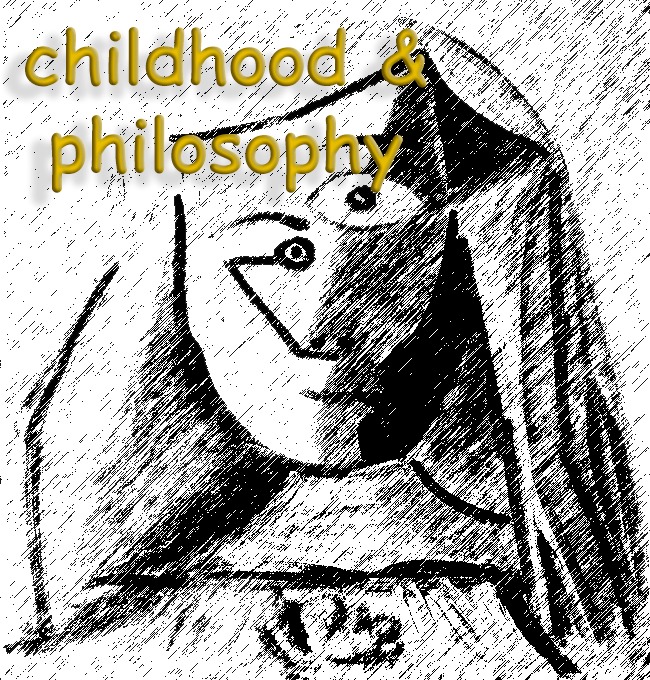el círculo historias como práctica de investigación democrática y crítica
DOI:
https://doi.org/10.12957/childphilo.2021.55722Palabras clave:
filosofía para niñxs, comunidad de investigación filosófica, círculo de historias, democraciaResumen
Los autores de este ensayo han sido comprometidos practicantes y maestros de Filosofía para Niñxs en una variedad de ambientes educativos, desde preescolares hasta programas de doctorado universitario y de educación comunitaria y religiosa para adultos. La promoción del pensamiento crítico siempre ha sido un objetivo primordial de este movimiento. Pero las prácticas comunales de pensamiento crítico necesitan incluir otros tipos de conversación democrática que nos inciten a ver a las demás como personas de pleno derecho y a tener curiosidad sobre cómo nuestro estar en comunidad con ellos hace posible el crecimiento y la auto-corrección. A medida que continuamos experimentando e innovando en nuevos contextos nos vemos continuando la investigación sobre la expansión de la inclusividad de las conversaciones sobre las preocupaciones humanas básicas. En este ensayo describimos una estrategia inclusiva llamada círculo de historias, que se desarrolló primero como un método de educación popular en Dinamarca y luego se adaptó como una herramienta de cambio social entre los ciudadanos norteamericanos pobres y desempoderados en los Apalaches. Los círculos de historias se utilizaron más tarde en una comunidad de aprendizaje filosófico vivencial y, más recientemente, se combinó con el método de diálogo de Lipman y Sharp de la comunidad de investigación filosófica. Los autores de este artículo han combinado los círculos de historias con la comunidad de investigación filosófica en una diversidad de contextos. En cada iteración, contar la propia historia y escuchar atentamente las historias de los demás pueden ser acciones igualmente reveladoras.
Descargas
Citas
Bouchard, N. (2006) Éthique et culture religieuse à l’école. Québec, QC: Presses de l’Université du Québec.
Bouchard, N. and Daniel, M.-F., eds. (2010) Penser le dialogue en éducation éthique. Québec, QC: Presses de l’Université du Québec.
Cam, P. (1994). Dewey, Lipman, and the Tradition of Reflective Education. In Taylor, Michael et al, eds. Pragmatism, Education and Children. Amsterdam: Editions Rodopi, 1994, 163-81.
Clark, S. (1990) Ready from Within: A First Person Narrative. Trenton, NJ: Africa World Press, Inc.
Englund, L. (2005) A Living Education: An Approach for the 21st Century. PhD thesis, University of Minnesota, Minneapolis [Online]. www.tc.umn.edu/~engl8813/Living_education.pdf, accessed 25 March 2016.
Ennis, R.H. (2015). Critical thinking: A streamlined conception. In M. Davies and R. Barnett (Eds.), The Palgrave handbook of critical thinking in higher education (pp. 31-47). New York, NY: Palgrave Macmillan.
Fletcher, N. (2019) Destabilizing stereotyped concepts in childhood. Prospects: Comparative Journal of Curriculum, Learning and Assessment, 182.
Gregory, M. and Laverty, M. (Eds.) (2018) In Community of Inquiry with Ann Margaret Sharp: Philosophy, Childhood and Education. London: Routledge.
Goodwin, C. and Duranti, A. (1992) Rethinking Context: Language as an Interactive Phenomenon. Cambridge, MA: Cambridge University Press.
Horton, M. (1998) The Long Haul: An Autobiography. New York: Teachers College Press.
Horton, M., Freire, P., Bell, B., Gaventa, J. and Peters, J. (1990) We Make the Road by Walking: Conversations on Education and Social Change. Philadelphia, PA: Temple University Press.
Horton, M. and Moyers, B. (1982) The Adventures of a Radical Hillbilly: An Interview with Myles Horton. Appalachian Journal 9(4): 248-285.
James, W. (1916) Talks to Teachers on Psychology. New York: Henry Holt and Company.
Lipman, M. (1985). Philosophy for children and critical thinking. National Forum 65(1): 18 23.
Lipman, M. (1988). Critical thinking: what can it be? Educational Leadership 16(1): 38-43.
Lipman, M. (1992). Unreasonable people and inappropriate judgment. Inquiry: Critical Thinking Across the Disciplines 10(3): 18-22. doi: 10.5840/inquiryctnews199210319
Lipman, M. (1997). Thinking in community. Inquiry: Critical Thinking across the Disciplines 16(4): 6-21.
Lipman, M. (2003). Thinking in education (2nd edition). Cambridge, MA: Cambridge University Press.
Marsilli-Vargas, X. (2014). Listening genres: The emergence of relevance structures through the reception of sound. Journal of Pragmatics. (69) 42-51.
Matthews, G.B. (1980). Philosophy and the Young Child. Cambridge, MA: Harvard University Press.
Matthews, G.B. (1984). Dialogues with Children. Cambridge, MA: Harvard University Press.
Matthews, G.B. (2009). ‘Philosophy and Developmental Psychology: Outgrowing the Deficit Conception of Childhood,’ in Siegel, H. (ed.), The Oxford Handbook of Philosophy of Education, pp. 163-176. Oxford University Press.
Palmer, P. (1998) The Courage to Teach: Exploring the Inner Landscape of a Teacher’s Life. San Francisco: John Wiley and Sons.
Peirce, C.S. (1997) “The Fixation of Belief.” In Pragmatism: A Reader, edited by Louis Menand. New York: Vintage.
Shea, P. (2008) Philosophy for Children and Learning Circles: How Do We Help People to Want to Be Better? Retrieved 11 July 2017 from http://gambitsanddrafts.blogspot.com/2015/02/philosophy-for-children-and-residential.html.
Thayer-Bacon, B. J. (2000). Transforming critical thinking: Thinking constructively. New York, NY: Teachers College Press.
Wallace, J. (2002) Correction: Invitation to storytelling learning circle. Workshop announcement retrieved 8 July 2017 from http://evergreen.loyola.edu/rcrews/www/sl/archives/jan02/msg00013.html.
Wallace, J. (2004) Notes on Learning Circles. In “Learning Circles: A Train-the-Trainers Approach,” pp. 10-23, retrieved 13 June 2017 from http://bonnernetwork.pbworks.com/f/BonCurFacilLearnCircles.pdf.
Wallace, J. (2007) The Problem of Time: Enabling Students to Make Long-Term Commitments to Community-Based Learning. Michigan Journal of Community Service Learning 7: 133-142 (retrieved 13 June 2017 from http://hdl.handle.net/2027/spo.3239521.0007.115).
Young, I. (1996) Communication and the Other: Beyond Deliberative Democracy. In Democracy and Difference, edited by Seyla Benhabib. Princeton: Princeton University Press.
Descargas
Publicado
Número
Sección
Licencia
el copyright de cada artículo pertenece a cada autor. childhood & philosophy tiene el derecho a la primera publicación. el permiso de reimprimir cualquier artículo que haya aparecido en la revista necesita de la autorización escrita del autor. en adisión a cualquier forma de reconocimiento requerido por el autor el siguiente aviso debe ser añadido a la declaración de permiso en la reimpresión (con los números apropiados a los puntos suspensivos): [título del artículo] fue publicado originalmente en la infancia y la filosofía, tomo ..., número ..., pp. ...-...




